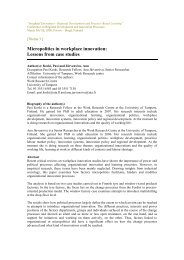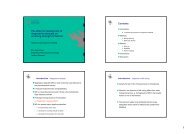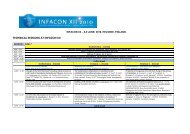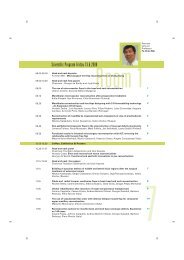Enhancing employees' innovation activity through motivational factors
Enhancing employees' innovation activity through motivational factors
Enhancing employees' innovation activity through motivational factors
You also want an ePaper? Increase the reach of your titles
YUMPU automatically turns print PDFs into web optimized ePapers that Google loves.
“Insightful Encounters - Regional Development and Practice–Based Learning”<br />
Conference on Regional Development and Innovation Processes<br />
March 5th-7th, 2008, Porvoo - Borgå, Finland<br />
kind of character is distinguishing the leadership behavior, because the employees themselves<br />
must be open-minded and ready to try something new in the competitive business environment.<br />
When comparing the empirical <strong>factors</strong> to those presented in theory, some observations were<br />
made. Money was not mentioned at all among the salespeople, apart from one exception. No one<br />
was worried of losing their jobs (job security) or the appreciation of work done. Instead,<br />
possibilities to personal development were mentioned a lot as a motivating factor.<br />
As further studies, the benefits from this action research process can be further used in<br />
considering managerial practices (For example reward system) that enhance motivation.<br />
References<br />
Amabile, T. 1998. “How to kill creativity.” Harvard business review, Vol. 76, n o 5, 1998, p.77-<br />
78.<br />
Andersson, T. and Tengblad, S. 2007. “Analyzing concepts fro work-life transformation.”<br />
Presented at The ICSB 2007 World Conference June 13 th - 16 th Turku, Finland.<br />
Avison, D., Lau, F., Myers, M., and P. Nielsen. 1999. “Action research.” Communications of the<br />
ACM, Vol. 42, n o 1, 1999, p.94-97.<br />
Avison, D., R. Baskerville and M. Myers. 2001. “Controlling action research projects.”<br />
Information technology & people, Vol. 14, n o 1, 2001, p.28-45.<br />
Bessant, J. and Tidd, J. 2007. Innovation and entrepreneurship. John Wiley and sons Ltd: West<br />
Sussex, England.<br />
Bettencourt, L.A. 2004. “Change-oriented organizational citizenship behaviors: the direct<br />
and moderating influence of goal orientation.” Journal of Retailing, Vol. 80, p. 165-180.<br />
Chesbrough, H. 2003. Open <strong>innovation</strong>- the new imperative for creating and profiting from<br />
technology. Harvard business school press.<br />
Choi, J.N. 2007. “Change-oriented organizational citizenship behavior: effects of work<br />
environment characteristics and intervening psychological processes.” Journal of Organizational<br />
Behavior, Vol. 28, p. 467-484.<br />
Cronholm, S. and Goldkuhl, G. 2004. “Conceptualising participatory action research- three<br />
different practices.” Electronic journal of business research methods, Vol. 2, n o 2, p. 47-58.<br />
Coyle-Shapiro, J., Morrow, P.C. and Kessler, I. 2006. “Serving two organizations: exploring the<br />
employment relationship of contracted employees”, Human Resource Management, Vol. 45, n o 4,<br />
p. 561-583.<br />
De Bono, J. and Colbert, A. 2005. “Understanding responses to multi-source feedback: The role<br />
of core self-evaluations.” Personnel Psychology, Vol. 58, n o 1, p. 171-203.<br />
Dodgson, M., Gann, D. and Salter, A. 2006. “The role of technology in the sift towards open<br />
<strong>innovation</strong>: the case of Procter & Gamble.” R & D Management. Vol. 36, n o 3, p. 333-346.








